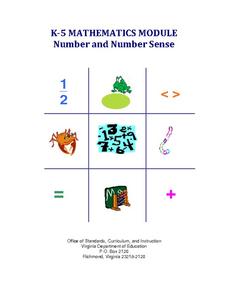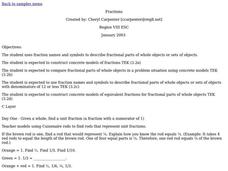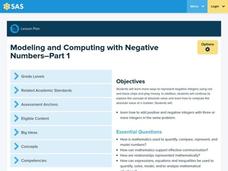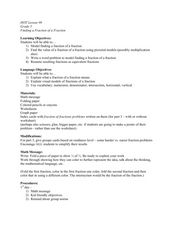EngageNY
Solving General Systems of Linear Equations
Examine the usefulness of matrices when solving linear systems of higher dimensions. The lesson plan asks learners to write and solve systems of linear equations in four and five variables. Using matrices, pupils solve the systems and...
University of Minnesota
Connect the Neurons!
Create a neuron frenzy as your pupils play the part of the neurons. An engaging lesson plan creates a human chain of neurons that pass cotton balls posing as neurotransmitters. Scholars learn about pre- and post-synapses as they...
California Academy of Science
Earthquakes and Tectonic Plates
Here is a comprehensive package in which middle schoolers learn about types of seismic waves, triangulation, and tectonic plate boundaries. Complete vocabulary, colorful maps, and a worksheet are included via links on the webpage. You...
National Institute of Open Schooling
Chemical Arithmetics
Substances with the same empirical and molecular formula must be differentiated by their structural formula. Part two in a series of 36 has pupils using chemical formulas to calculate how much of a compound is present in a given...
CK-12 Foundation
Division of Fractions: Stacking Berets
Seven questions make up an interactive designed to boost mathematician's skills in dividing whole numbers by mixed fractions. Practice comes with a visual aid with movable parts. Questions types include fill in the blank,...
Curated OER
K-5 Mathematics Module: Number and Number Sense
Reinforce number sense with a collection of math lessons for kindergarteners through fifth graders. Young mathematicians take part in hands-on activities, learning games, and complete skills-based worksheets to enhance proficiency...
University of North Carolina
Reading to Write
Silly journal and essay prompts may be fun to write, but they don't model the kind of writing needed for college papers and standardized tests. The 15th part in a series of 24 covers the concept of reading to write—during and after...
Macmillan Education
Christmas: #SadTree
Christmas trees can be as large and elaborate as the tree in Rockefeller Center, or as small and understated as Charlie Brown's tree in A Charlie Brown Christmas. But where did the tradition of Christmas trees come from? An engaging...
Science Matters
Matter Cycles — Sum It Up
Scholars become part of the cycle of matter with a reader's theater that showcases producers, consumers, decomposers, and the sun. A diagram and discussion concludes the learning experience and enhances comprehension.
Curated OER
Worksheet 1-Tener
Are your Spanish speakers learning the verb tener? After covering the basics as a whole class, provide your learners with some independent practice. Use this to gauge where they might need extra help.
Curated OER
Fractions
Young mathematicians use fraction names and symbols to describe fractional parts of whole objects or sets of objects. They construct concrete models of fractions, and compare fractional parts of whole objects in a problem situation using...
Curated OER
Understanding Fractions - Cookbook Comparisons
Learners explore equal fractions in relationship to a whole unit. They fold strips of paper into halves, thirds, etc. and compare them to the first strip which represents a "whole unit." Fractional parts are identified and compared.
Curated OER
Introduction to Equivalent Fractions
Explore equivalent fractions! Youngters measure the crown of their head with adding tape labeled with various fractions and fractional parts, and compare strips to notice numerical relationships. They fold adding tape in half and color...
Curated OER
Introduction to Fractions
With this packet, kids are introduced to fractional concepts by completing 10 pages of exercises. They learn equal and unequal parts, shading fractions, looking at pictures to determine fractions, finding equivalent fractions and finding...
Curated OER
Dividing with Fractions
Use paper strips or models to relate division problems to division of fraction problems. Since the materials can be broken up, it helps them to show how they can complete repeated subtraction with fractions and not just whole numbers.
Curated OER
Finding a Fraction of a Fraction
Teach your math class to determine the value of fractions. The group will explore how to break a fractional part into smaller pieces, which helps strengthen their understanding of the part/whole relationship of fractions. A written...
Curated OER
Fraction Circles
Fourth graders receive a fraction circle and show how each different part makes a whole. Students compare the different fractions that make up a whole. Students choose 2 fractions which are inside a bucket and they compare them both...
Curated OER
The Divider (whole number remainders)
Third graders use the lesson to support division of whole numbers where there is either no remainder or whole number remainders. They are able to
slit division problems into parts using known multiplication and division facts.
Curated OER
Fraction Halves
When you cut an object into two equal parts, you're creating halves or fractions. Introduce the numerator, denominator, and what they represent to your class. They review what a fraction is and then label the images that are halves.
Curated OER
Chocolate Bar Math
How many ways can you use a chocolate bar to engage mathematical reasoning? This slideshow gives you seven to choose from. Part/whole, fractions, counting, and using chocolate bars as arrays are only a few. Note: This is a presentation...
Curated OER
Analyzing Verb Use: Part 2
With the Wordle ap in one hand, and their favorite writing piece in the other, 3rd graders analyze their verb usage. They select a piece they have written, type it into Wordle, then analyze their word choices and alter them using synonyms.
Curated OER
Fractions of Quantities
What is 1/4 of 36? The class will work through six examples and 4 problems to better understand the relationship between fraction and quantity. The first six example show how a whole is broken into equal parts and is represented as a...
Curated OER
I'll Halve S'More, Please!
An episode of Cyberkids is shown, and learners interact with web based activities to discover how fractions are parts of a whole. They study the names of fraction parts, add and subtract fractions, and recognize equivalent fractions.
Curated OER
Half- Thirds- Quarters
A one page worksheet for early fraction learners. They check 3 diagrams in which a shape is analyzed and the indicated part is marked as: one half, one third, or one quarter.
Other popular searches
- Parts and Wholes
- Parts to Wholes
- Fractions Parts and Wholes
- Math Parts and Wholes
- Fractions Parts of Wholes
- Parts and Wholes Science























